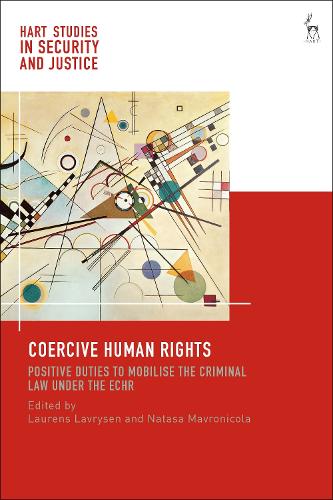
Coercive Human Rights: Positive Duties to Mobilise the Criminal Law under the ECHR
(Paperback)
Available Formats
Publishing Details
Coercive Human Rights: Positive Duties to Mobilise the Criminal Law under the ECHR
By (Author) Laurens Lavrysen
Edited by Dr Natasa Mavronicola
Bloomsbury Publishing PLC
Hart Publishing
28th July 2022
United Kingdom
Classifications
Tertiary Education
Non Fiction
Public international law: human rights
Comparative law
345.2405
Physical Properties
Paperback
312
Width 154mm, Height 232mm, Spine 22mm
500g
Description
Traditionally, human rights have protected those facing the sharp edge of the criminal justice system. But over time human rights law has become increasingly infused with duties to mobilise criminal law towards protection and redress for violation of rights. These developments give rise to a whole host of questions concerning the precise parameters of coercive human rights, the rationale(s) that underpin them, and their effects and implications for victims, perpetrators, domestic legal systems, and for the theory and practice of human rights and criminal justice. This collection addresses these questions with a focus on the rich jurisprudence of the European Court of Human Rights (ECtHR). The collection explores four interlocking themes surrounding the issue of coercive human rights: First, the key threads in the doctrine of the ECtHR on duties to mobilise the criminal law as a means of delivering human rights protection. Secondly, the factors that contribute to a readiness to demand coercive measures, including discrimination and vulnerability, and other key justificatory reasoning shaping the development of coercive human rights. Thirdly, the most pressing challenges for the ECtHRs coercive duties doctrine, including: - how it relates to theories and rationales of criminalisation and criminal punishment; - its implications for the fundamental tenets of human rights law itself; - its relationship to transitional justice objectives; and - how (far) it coheres with the imperative of effective protection for persons in precarious or vulnerable situations. Fourthly, the (prospective) evolution of the coercive human rights doctrine and its application within national jurisdictions.
Reviews
This volume is an excellent example of a critical examination of the jurisprudence of the ECHR. It not only provides clarity about their guidelines, justification and implications in an area that is gaining in importance, but also provides impetus for further development as well as references to possible limits and risks of the concept of criminal law protection obligations. -- Philip Czech * Newsletter Menschenrechte (Bloomsbury translation) *
This volume demonstrates, in a holistic way, how coercive human rights duties have inevitably generated tensions with some of the more orthodox concerns of human rights law It also offers a solid basis from which to reappraise concrete developments related to the criminal law (enforcement) tools that are capable of affording effective redress for human rights violations and determine individual criminal liability. * Europe des Droits & Liberts *
Author Bio
Laurens Lavrysen is a Postdoctoral Researcher (funded by the FWO Research Foundation Flanders), connected to the Human Rights Centre of Ghent University. Natasa Mavronicola is Reader in Law at Birmingham Law School, University of Birmingham.
